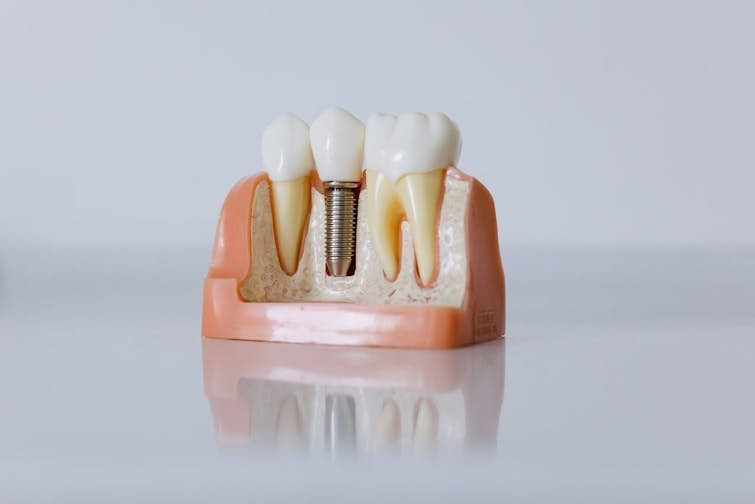There are currently 3,000,000 Americans with dental implants in the US. And that number is constantly growing. So, if you're among the over 500,000 Americans who will receive dental implants this year, you might wonder if Medicare will cover the work.
What are dental implants?
Dental implants can last a lifetime with proper care, so they can be a cost-effective and long-term solution for missing teeth. They are artificial tooth roots surgically implanted in the jawbone to replace your original root. They support dental work such as crowns, bridges, or dentures. Dental implants function and look like natural teeth, giving you a chance to restore your oral health and regain your confidence.
So, how do you fund this type of procedure in the first place?
How much do dental implants cost?
The cost of dental implants can be eye-watering.
If you need a mouthful of artificial tooth roots and don't have any additional coverage, it'll cost you somewhere between $60,000 and $90,000 to get the dental procedures done. That's not the kind of money many of us have lying around.
But could Medicare cover some of your dentistry work? The answer is, it's complicated.
Let's look at how Medicare works and then delve into ways to save on your dentistry bill.
How does Medicare work?
Medicare is a federal health insurance program that has been helping seniors aged 65 and over in the US access healthcare affordably for over 50 years. It also covers younger people with some disabilities and those with End-Stage Renal Disease.
Back in 1965, the Social Security Act created Medicare to provide affordable healthcare to seniors who were struggling to access it. Since then, the program has expanded to offer more benefits and cover more people.
Medicare is divided into four different parts, each tackling different aspects of healthcare:
- Medicare Part A takes care of hospital stays, hospice care, and skilled nursing facility care.
- Medicare Part B covers outpatient care, like doctor visits, lab tests, and medical equipment.
- Medicare Part C, or Medicare Advantage, lets you receive your Medicare benefits through private insurance companies.
- Medicare Part D is a type of drug coverage; it covers you for prescription drug costs.
If you're eligible for Medicare, you can enroll during specific enrollment periods, and you might even get Part A and Part B for free. But, depending on your coverage and income level, you may need to pay premiums, deductibles, and copayments.
Some Medicare supplement plans, also known as Medigap plans, cover your share of costs not covered by Medicare. You can use the Medicare Plan Finder tool on the official Medicare.gov website to compare and enroll in plans that fit your needs and budget.
So does Medicare cover dental implants?
It depends. Typically, the "original" Medicare package, comprising Part A and Part B, will not cover any sort of dental checkups or routine dental care, such as tooth extractions, fillings, and cleanings.
There may be some exceptions to the rule, however. For instance, if you need to stay in the hospital after a dental procedure, the hospital stay may be covered under Part A, even if the dental work isn't covered. Also, if you need dental tests as part of a covered health procedure, like heart valve replacement, for instance, then this may be covered, too.
If you opt for a Medicare Advantage plan, this type of policy may include a dental insurance plan. You'll then need to double-check what the various dental plans cover; some may cover implant or oral surgery, whereas others may be more limited. This type of Medicare coverage can vary based on the provider.
What is Medicare Advantage?
Medicare Advantage (also known as Part C) is a possible addition to original Medicare. If you have Medicare Part A and Part B, you can look into Medicare Advantage. These plans, which private insurance companies sell, offer extra benefits that may include dental, vision and hearing coverage. Typically, these additional benefits come with higher monthly premiums.
Many Medicare Advantage plans also come with Part D as standard. This means that your prescriptions are included as well.
However, if you're considering adding Medicare Advantage to your Medicare plan, you should bear in mind that, in some cases, this may mean your work or union health plan will be invalidated as a result. It's a good idea to speak to your employer before committing, as you may not be able to get your plan back. If you lose your employer-based health insurance, your partner and children may lose their entitlement, too.
Medicare Advantage can be a great addition to your Medicare package and could even get you affordable dental care, but you should "proceed with caution" to ensure you're not losing out on a better deal.
What is the cost of Medicare Advantage with dental coverage?
The cost of Medicare Advantage plans varies depending on the specific plan and the state you live in. The average is around $28, which is paid on top of your Medicare Part A and Part B if you don't qualify for a free plan.
However, Medicare Advantage plans with dental coverage are generally more expensive. Keep in mind that you may still have to pay copays, coinsurance, and deductibles for dental services, even if your Medicare Advantage plan covers them.
What is the difference between Medicare and Medicaid?
If you've been looking into Medicare, you might have also come across Medicaid. It's easy to confuse Medicare and Medicaid, but they're actually quite different.
While both programs are designed to provide healthcare coverage, Medicaid is a joint federal and state program that provides healthcare coverage to people with limited income and resources.
Each state determines which dental benefits adults enrolled in Medicaid receive, with emergency dental services often being the only coverage provided on the rare occasions when dental coverage is provided at all by the plans. Typically, your dental implants won't be covered through Medicaid either, as they are rarely considered "medically necessary."
As such, it's unlikely you'll be able to use either Medicaid or Medicare (Part A and B) to fund your dental implants.
How to get dental implants with Medicare
Getting dental implants through Medicare can be complex and, in some instances, verging on the impossible. If you're looking for dental implant coverage through Medicare, you'll need to make sure you're eligible for Part A and Part B of Medicare, enroll in those, and then enroll in a Medicare Advantage plan that offers this type of dental coverage.
It'll be up to you to research and ensure the plan you've selected covers you appropriately. Keep in mind that the cost of these plans can vary, and you may still have out-of-pocket expenses for dental services. Also, if you opt for the Medicare Advantage plan, you may lose out on work-related health insurance policies, which could potentially mean your dependents lose their health insurance, too.
Take your time working out the best course of action for you before you commit to Medicare to fund your dental implants.
Image Credit: cottonbro studio at Pexels



